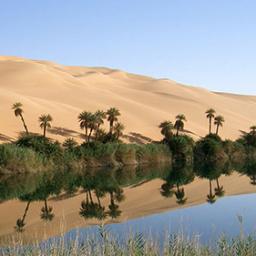Greenhouse gases could cause a wet Africa
 New research demonstrates that an increase in greenhouse gas concentrations thousands of years ago was a key factor in causing substantially more rainfall in two major regions of Africa. It was the most recent time during which natural global warming was associated with increases in greenhouse gas concentrations. Following a long dry spell during the glacial maximum, the amount of rainfall in Africa abruptly increased, starting around 14,700 years ago and continuing until around 5,000 years ago. So intense was the cumulative rainfall, turning desert into grasslands and savannas, that scientists named the span the African Humid Period (AHP).
New research demonstrates that an increase in greenhouse gas concentrations thousands of years ago was a key factor in causing substantially more rainfall in two major regions of Africa. It was the most recent time during which natural global warming was associated with increases in greenhouse gas concentrations. Following a long dry spell during the glacial maximum, the amount of rainfall in Africa abruptly increased, starting around 14,700 years ago and continuing until around 5,000 years ago. So intense was the cumulative rainfall, turning desert into grasslands and savannas, that scientists named the span the African Humid Period (AHP).Previous studies had suggested that the AHP was triggered by a ~20,000-year cyclic wobble in Earth's orbit that resulted in increased summertime heating north of the equator. That summertime heating would have warmed the land in such a way as to strengthen the monsoon winds from the ocean and enhance rainfall. Instead, the study revealed the role of two other factors: a change in Atlantic Ocean circulation that rapidly boosted rainfall in the region, and a rise in greenhouse gas concentrations that helped enhance rainfall across a wide swath of Africa.
While the industrialized world looks to reduce greenhouse gas emissions to preserve our current climate, Africa could find itself benefiting from increased emissions.